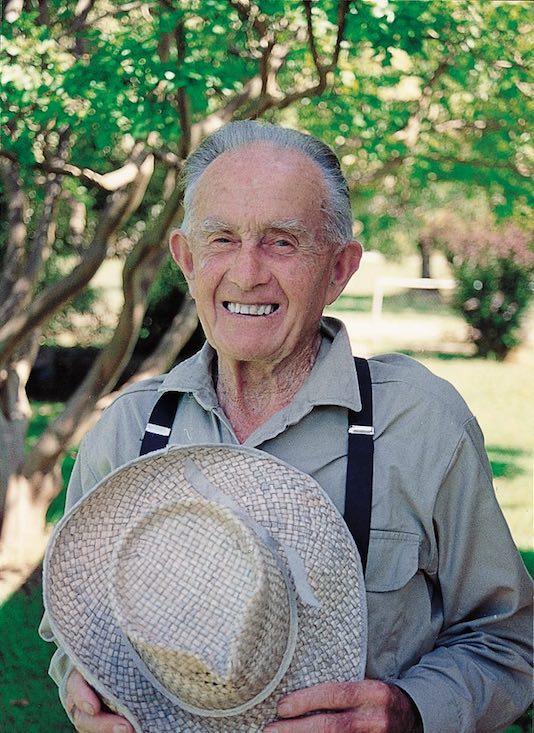Tips on how to beat cancer from 100-year-old farmer.
We were not designed for this! These bodies we live in were not designed for foods saturated with preservatives, antibiotics, artificial flavours, chemical fertilisers, pesticides and hormones, the doctor warned.
Nor were our bodies designed for foods with an altered molecular structure — foods ruined by irradiation, microwave cooking, deep frying, or scalding high temperatures, according to David A
Darbro, MD. He wrote this in the foreword to a “commonsense guide for eliminating sickness through nutrition” a decade ago.
Sixty years earlier a well-read farmer named Percy George Weston had a similar line of thought. A keen-eyed, diminutive dynamo who rarely became sick, he found himself at 31 in the prime of life burnt out, drained of energy. His doctor diagnosed anaemia. Weston wondered if his typical Australian
diet were to blame, perhaps in lacking certain mineral elements. Investigation revealed the pattern. His staple foods — such as porridge, bacon and eggs, meats, bread, beans, macaroni, pork, rice, potatoes and tomatoes — contained a greater abundance of acid minerals such as phosphorus and chlorine than alkaline minerals such as calcium, potassium and magnesium. Was this constant
diet making his body too acid to function properly?
He suspected his growing the vegetables in a field that he regularly fertilised with superphosphate (to please Virginia-leaf tobacco buyers) had made matters worse. He knew from his field experiments that “constant use of super-soluble phosphatic fertilisers could skew the take-up of minerals and trace elements in food crops, producing mineral-poor foods,” as he was to write in Cancer: Cause & Cure.
Nature’s Secrets Exposed (Bookbin) first published in 2001. Percy Weston made a full and rapid recovery by switching to a set of foods with abundant alkaline minerals, including fruits and vegetables from his father’s organic orchard. He became convinced of the need to formulate a cellular dietary
supplement to neutralise acids in the body to make up for imbalances of minerals in the food chain.
The spur to its development came with a bout of arthritis in his forties, when he was able to put his studies of crop nutrition and observations of the mineral preferences of sheep to good advantage. A largely vegetarian diet and the new mineral supplement worked wonders. It was the beginning. The fine-tuning of the formula was to take decades.
Concerns about health drove him on, especially important after World War 2 when agricultural chemicals flooded on to the market and he was advised by the “experts” to use them.
Yet when he did so he had problems of insect infestation and animal mortality. For the district as a whole the cancer rate was rising. Finally he came down with cancer himself.
Self-reliance was the name of the game, as he had few financial resources and felt he could no longer trust the scientific community, whose advice so often turned out to be wrong. He cured himself with diet and the mineral powder.
As the fame of his diet and mineral supplement for humans spread, especially after dramatic recoveries from cancer of family and friends, documented in the book, he became very busy on his sheep and walnut farm at Eurobin, in Victoria, opposite Mt Buffalo National Park. Hundreds of entries in his visitors’ book are testimony to this. They came to buy Percy’s mineral powder and they hung on his words of advice as one who speaks of what he knows.
Three years into the 21st century, centenarian Percy, as few others, could look back to a time when commercially grown fruits and vegetables possessed homegrown qualities of distinctive flavour and
freshness. There were more varieties and flavours of apples available before the era of atomic weapons testing and the age of mass production. Farmers had fewer problems with insects before chemists unleashed potent pesticides that killed both prey and predator and chemical companies upset the biological balance of the soil web with new super-soluble fertilisers. Grazing animals thrived on natural pasture in good country that was not over-stocked and thereby not quickly depleted of trace minerals. And most of Percy’s father’s generation led active lives into their 60s and well beyond without succumbing to cancer, arthritis, diabetes and other “modern” metabolic and degenerative diseases.
Percy’s advice is that we eat “living” food, preferably fresh picked. You can tell the difference. High-quality produce gives you energy and you need less of it to feel full. It is rich in minerals and will not readily rot. It will only dehydrate.
Percy saw from nature what man was doing wrong and provided a practical and affordable way to check disease and maintain wellness. He grew much of his food in good soil by organic methods and supplemented with sprinklings of his mineral formula that ionizes in water, or better still the powder stirred into a glass of cold water with the juice of half a lemon. The mixture — key electrolytes present
in exact ratios of bioavailable sulphates — is now available from leading health-food retailers.
To get the full story of Percy Weston’s life-long quest to discover the road back to wellness, order your personal copy of Cancer: Cause & Cure.

